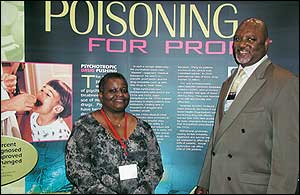National association votes unanimously to support congressional
legislation to protect children's rights

Rev. Fred Shaw, president of Compton's NAACP branch, and Mikki Jenkins, executive director, played the leading role in creating the national association's resolution against child-drugging. Shaw and Jenkins then took the resolution to Washington, using it to press for passage of the Child Medication Safety Act.
|
When it came to the issue of psychiatric drugging of school children, the message
at the 94th Annual NAACP national convention in Miami Beach, Florida was clearly,
"Don't mess with our kids."
NAACP delegates and National Board members joined President and CEO Kweisi
Mfume and Chairman Julian Bond in unanimously passing a resolution condemning
the inappropriate psychiatric drugging of children and the misuse of special education
to stigmatize African-American children, and endorsed the Child Medication Safety
Act of 2003, now before the U.S. Senate after having passed in the House of Representatives
by a 4251 vote in May.
President of the Compton NAACP, Fred Shaw and Executive Director Mikki Jenkins
submitted the resolution, which calls on the NAACP to warn its members and the
African American community of the dangers of putting children on psychiatric drugs
such as Ritalin. As well, Shaw and Jenkins sought and won the NAACP's support
for the national legislation that, once passed in both Houses, will guarantee
parental discretion in deciding whether or not to subject their children to psychiatric
drugging.
"I had become increasingly alarmed about our normal African-American males
being labeled with various mental disorders," said Shaw. "The drugs they are prescribed
to 'treat' them amount to a chemical lynching. I wanted the NAACP to do something
actively to combat this on a national level."
Mikki Jenkins expressed equal concern about racially based subjective psychiatric
diagnoses and their effects on minority children.
"In essence, the resolution cites disturbing statistics and findings from
the medical profession on the harmful side effects of psychotropic drugs and the
racial discrepancies in special education," said Jenkins. "Studies have shown
that minority boys are 11 times more likely to be subjected to mind-altering medications,
while 32% of the students in programs for mild retardation are African-American.
I am concerned that subjective psychiatric diagnoses that are racially based are
a plague to minorities when medical and objective diagnoses and testing would
refute assertions of mental or emotional disability."
The NAACP resolution points out that many behavior problems displayed by children
labeled with learning disabilities are the same types of symptoms caused by diet
and nutritional deficiencies and environmental toxins, such as lead, mercury and
pesticides. Dr. LMJ Pelsser of the Research Center for Hyperactivity and ADHD
in Middelburg, Netherlands, found that 62% of those diagnosed with ADHD showed
significant improvements in behavior as a result of a change of diet over a period
of three weeks.
The resolution also notes the considerable amount of controversy and diversity
of opinion among medical professionals regarding the validity of childhood behavioral
or learning disorders such as ADHD and ADD. It states that labeling a child with
these disorders has led to school personnel coercing parents into accepting psychiatric
diagnoses for their children's behavior, leading to the children being placed
on psychiatric drugs.
"Parents should not have to choose between drugging their child with psychiatric
drugs and keeping them out of school," insists Jenkins. "Nor should Child Protective
Services be allowed to threaten parents with charges of 'medical neglect' for
refusing to subject their children with mind-altering drugs.
"Parents need their rights safeguarded so they can make informed decisions
on the health and educational needs of their children," she concluded.
|


